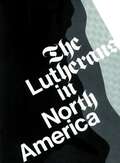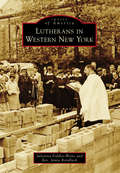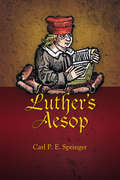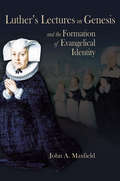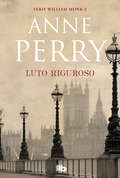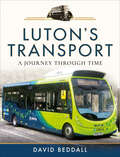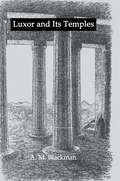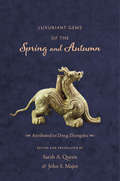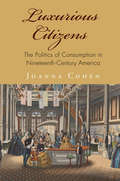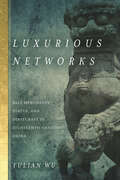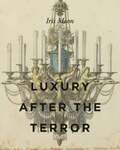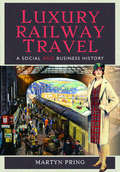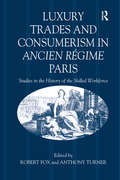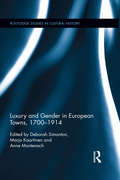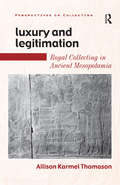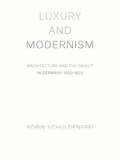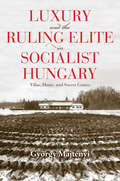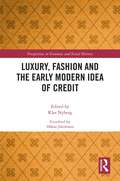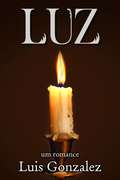- Table View
- List View
Lutheranism in North America, 1914-1970
by E. Clifford NelsonThis volume is the most comprehensive scholarly study of 20th century Lutheranism in North America. E. Clifford Nelson's personal experience and careful research describes decisions and events that brought Lutheran bodies in North America to their present theological and cultural positions. The book is an indispensable guide to understanding the ongoing question of fellowship and cooperation. Nelson not only provides the historical background but also spotlights some of the significant issues facing the church in the 70s. E. Clifford Nelson is professor of religion at St. Olaf College in Northfield, Minn. He has worked with the Lutheran Federation and other national and international bodies and taught for 14 years in Luther Seminary in St. Paul. Previous publications include a two volume study, The Lutheran Church Among Norwegian-Americans (E. L. Fevold, co-author of Vol I), and articles in church and professional journals as well as in encyclopedias, including in the Encyclopaedia Britannica.
Lutherans in North America
by Theodore G. Tappert E. Clifford Nelson H. George Anderson August R. Suelflow Eugene L. Fevold Fred W. MeuserLutherans came to North America, starting in the 1600s, chiefly from Germany, Norway, Denmark, Sweden, Finlad and a few from Poland and Slovakia. This book, co-authored by six Lutheran scholars, recounts their journey to North America and describes their church life once they arrived. They grouped into synods, initially based on their countries of origin and later based on conservative or liberal thinking. Much of the book concerns itself with attempts to unify Lutherans into one church with a common hymnal and style of worship. As of 1979, when this book closes its history, cooperation has increased but full unity is not yet achieved.
Lutherans in Western New York
by Julianna Fiddler-Woite Rev Jamie RetallackDuring the construction of the Erie Canal in the early 1820s, the population of Western New York increased 145 percent. Many of these pioneers were European immigrants, with a high concentration hailing from the German-speaking states. These immigrants brought their Lutheran ideals and continued to practice the religion in their new homeland. By 1827, the first official Lutheran church in Erie County had been incorporated as the German Reformed Church, known today as St. Paul's Lutheran Church in Eggertsville. Soon after, the need for mission churches arose, and by the mid-1800s, Lutheran congregations had been established in several Western New York suburbs. During the following century, the Lutherans in Western New York would undergo growth and change. While all congregations eventually abandoned German as their primary language, many struggled to further separate from their German roots during the Nazi regime. Today, there are nearly 200 Lutheran congregations in New York.
Luther’s Aesop (Early Modern Studies #8)
by Carl P. SpringerReformer of the church, biblical theologian, and German translator of the Bible Martin Luther had the highest respect for stories attributed to the ancient Greek author Aesop. He assigned them a status second only to the Bible and regarded them as wiser than "the harmful opinions of all the philosophers." Throughout his life, Luther told and retold Aesop’s fables and strongly supported their continued use in Lutheran schools. In this volume, Carl Springer builds on the textual foundation other scholars have laid and provides the first book in English to seriously consider Luther’s fascination with Aesop’s fables. He looks at which fables Luther knew, how he understood and used them, and why he valued them. Springer provides a variety of cultural contexts to help scholars and general readers gain a deeper understanding of Luther’s appreciation of Aesop.
Luther’s Aesop (Early Modern Studies)
by Carl P. SpringerReformer of the church, biblical theologian, and German translator of the Bible Martin Luther had the highest respect for stories attributed to the ancient Greek author Aesop. He assigned them a status second only to the Bible and regarded them as wiser than "the harmful opinions of all the philosophers." Throughout his life, Luther told and retold Aesop’s fables and strongly supported their continued use in Lutheran schools. In this volume, Carl Springer builds on the textual foundation other scholars have laid and provides the first book in English to seriously consider Luther’s fascination with Aesop’s fables. He looks at which fables Luther knew, how he understood and used them, and why he valued them. Springer provides a variety of cultural contexts to help scholars and general readers gain a deeper understanding of Luther’s appreciation of Aesop.
Luther’s Lectures on Genesis and the Formation of Evangelical Identity (Sixteenth Century Essays & Studies #80)
by John A. MaxfieldMartin Luther's lectures on Genesis, delivered at the University of Wittenberg during the last decade of his life and later published by his students, allow modern readers to view a sixteenth-century professor engaging his students with the text of scripture and using that text to form them spiritually. The lectures show how Luther attempted to form in his students a new identity, an Evangelical identity, enabling them to make sense of the rapidly changing society and church in which they were being prepared to serve, primarily as pastors in the developing territorial churches of the Reformation.This study uses the text of the lectures to outline the contours of the new identity that Luther laid out through his exposition of Genesis. They include how Luther approached and taught his students to perceive the text of holy scripture; how that text unveiled for Luther the nature of Christian life in the world; and how Luther taught his students to view the past, the present, and the future of the church and the world through the book of Genesis.Whether in the published editions of the lectures the historic Luther was actually misunderstood or was transformed in some way into the prophetic Luther of later memory, the text reveals the Luther that his students heard and subsequent generations read.
Luther’s Lectures on Genesis and the Formation of Evangelical Identity (Sixteenth Century Essays & Studies)
by John A. MaxfieldMartin Luther's lectures on Genesis, delivered at the University of Wittenberg during the last decade of his life and later published by his students, allow modern readers to view a sixteenth-century professor engaging his students with the text of scripture and using that text to form them spiritually. The lectures show how Luther attempted to form in his students a new identity, an Evangelical identity, enabling them to make sense of the rapidly changing society and church in which they were being prepared to serve, primarily as pastors in the developing territorial churches of the Reformation.This study uses the text of the lectures to outline the contours of the new identity that Luther laid out through his exposition of Genesis. They include how Luther approached and taught his students to perceive the text of holy scripture; how that text unveiled for Luther the nature of Christian life in the world; and how Luther taught his students to view the past, the present, and the future of the church and the world through the book of Genesis.Whether in the published editions of the lectures the historic Luther was actually misunderstood or was transformed in some way into the prophetic Luther of later memory, the text reveals the Luther that his students heard and subsequent generations read.
Luther’s Legacy: The Thirty Years War and the Modern Notion of ‘State’ in the Empire, 1530s to 1790s
by Robert Von FriedeburgIn this new account of the emergence of a distinctive territorial state in early modern Germany, Robert von Friedeburg examines how the modern notion of state does not rest on the experience of a bureaucratic state-apparatus. It emerged to stabilize monarchy from dynastic insecurity and constrain it to protect the rule of law, subjects, and their lives and property. Against this background, Lutheran and neo-Aristotelian notions on the spiritual and material welfare of subjects dominating German debate interacted with Western European arguments against 'despotism' to protect the lives and property of subjects. The combined result of this interaction under the impact of the Thirty Years War was Seckendorff's Der Deutsche Fürstenstaat (1656), constraining the evil machinations of princes and organizing the detailed administration of life in the tradition of German Policey, and which founded a specifically German notion of the modern state as comprehensive provision of services to its subjects.
Luto riguroso (Detective William Monk #Volumen 2)
by Anne PerrySegunda novela del detective William Monk en la que tendrá que investigar el asesinato de una de las hijas del aristocrático clan de los Moidore. El aristocrático clan de los Moidore, una de las mejores familias de Londres, a cuya mansión de Queen Anne Street acuden los más encumbrados personajes, nunca se había visto en vuelto en el escándalo. Ahora, sin embargo, la bella hija de sir Basil ha aparecido apuñalada en su propia cama y la noticia corre de boca en boca por la ciudad. El inspector William Monk recibe la orden de encontrar al asesino sin demora, aunque evitando causarle mayores trastornos a una familia ya abrumada por la tragedia. Monk se halla todavía bajo los efectos de la amnesia, secuela de un grave accidente, pero sus facultades continúan intactas y, con la ayuda de Hester Latterly, se aproxima paso a paso a un asombroso descubrimiento.
Luton's Transport: A Journey Through Time
by David BeddallLocated in the Chiltern Hills, Luton has a rich transport history, being home to London Luton Airport and Vauxhall Motors. This south Bedfordshire town has also had an interesting public transport history, most notable being Luton Corporation Transport, Eastern National, United Counties and London Transport. The towns of Luton and Dunstable are linked by one of the longest guided busways in the world. Luton’s Transport takes a look at the development of Luton’s tramway, along with the development of bus and coach services in the Luton, Dunstable and Houghton Regis areas of Bedfordshire.
Luxor And Its Temples
by A.M. BlackmanFirst published in 2005. Routledge is an imprint of Taylor & Francis, an informa company.
Luxuriant Gems of the Spring and Autumn (Translations from the Asian Classics)
by Zhongshu DongThe Spring and Autumn (Chunqiu) is a chronicle kept by the dukes of the state of Lu from 722 to 481 B.C.E. Luxuriant Gems of the "Spring and Autumn" (Chunqiu fanlu) follows the interpretations of the Gongyang Commentary, whose transmitters sought to explicate the special language of the Spring and Autumn. The work is often ascribed to the Han scholar and court official Dong Zhongshu, but, as this study reveals, the text is in fact a compendium of writings by a variety of authors spanning several generations. It depicts a utopian vision of a flourishing humanity that they believed to be Confucius's legacy to the world.The Gongyang masters thought that Confucius had written the Spring and Autumn, employing subtle phrasing to indicate approval or disapproval of important events and personages. Luxuriant Gems therefore augments Confucian ethical and philosophical teachings with chapters on cosmology, statecraft, and other topics drawn from contemporary non-Confucian traditions. A major resource, this book features the first complete English-language translation of Luxuriant Gems, divided into eight thematic sections with introductions that address dating, authorship, authenticity, and the relationship between the Spring and Autumn and the Gongyang approach. Critically illuminating early Chinese philosophy, religion, literature, and politics, this book conveys the brilliance of intellectual life in the Han dynasty during the formative decades of the Chinese imperial state.
Luxurious Citizens: The Politics of Consumption in Nineteenth-Century America (America in the Nineteenth Century)
by Joanna CohenAfter the Revolution, Americans abandoned the political economy of self-denial and sacrifice that had secured their independence. In its place, they created one that empowered the modern citizen-consumer. This profound transformation was the uncoordinated and self-serving work of merchants, manufacturers, advertisers, auctioneers, politicians, and consumers themselves, who collectively created the nation's modern consumer economy: one that encouraged individuals to indulge their desires for the sake of the public good and cast the freedom to consume as a triumph of democracy. In Luxurious Citizens, Joanna Cohen traces the remarkable ways in which Americans tied consumer desire to the national interest between the end of the Revolution and the Civil War.Illuminating the links between political culture, private wants, and imagined economies, Cohen offers a new understanding of the relationship between citizens and the nation-state in nineteenth-century America. By charting the contest over economic rights and obligations in the United States, Luxurious Citizens argues that while many less powerful Americans helped to create the citizen-consumer it was during the Civil War that the Union government made use of this figure, by placing the responsibility for the nation's economic strength and stability on the shoulders of the people. Union victory thus enshrined a new civic duty in American life, one founded on the freedom to buy as you pleased. Reinterpreting the history of the tariff, slavery, and the coming of the Civil War through an examination of everyday acts of consumption and commerce, Cohen reveals the important ways in which nineteenth-century Americans transformed their individual desires for goods into an index of civic worth and fixed unbridled consumption at the heart of modern America's political economy.
Luxurious Networks: Salt Merchants, Status, and Statecraft in Eighteenth-Century China
by Yulian WuFrom precious jade articles to monumental stone arches, Huizhou salt merchants in Jiangnan lived surrounded by objects in eighteenth-century China. How and why did these businessmen devote themselves to these items? What can we learn about eighteenth-century China by examining the relationship between merchants and objects? Luxurious Networks examines Huizhou salt merchants in the material world of High Qing China to reveal a dynamic interaction between people and objects. The Qianlong emperor purposely used objects to expand his influence in economic and cultural fields. Thanks to their broad networks, outstanding managerial skills, and abundant financial resources, these salt merchants were ideal agents for selecting and producing objects for imperial use. In contrast to the typical caricature of merchants as mimics of the literati, these wealthy businessmen became respected individuals who played a crucial role in the political, economic, social, and cultural world of eighteenth-century China. Their life experiences illustrate the dynamic relationship between the Manchu and Han, central and local, and humans and objects in Chinese history.
Luxury After the Terror
by Iris MoonWhen Louis XVI was guillotined on January 21, 1793, vast networks of production that had provided splendor and sophistication to the royal court were severed. Although the king’s royal possessions—from drapery and tableware to clocks and furniture suites—were scattered and destroyed, many of the artists who made them found ways to survive. This book explores the fabrication, circulation, and survival of French luxury after the death of the king.Spanning the final years of the ancien régime from the 1790s to the first two decades of the nineteenth century, this richly illustrated book positions luxury within the turbulent politics of dispersal, disinheritance, and dispossession. Exploring exceptional works created from silver, silk, wood, and porcelain as well as unrealized architectural projects, Iris Moon presents new perspectives on the changing meanings of luxury in the revolutionary and Napoleonic periods, a time when artists were forced into hiding, exile, or emigration. Moon draws on her expertise as a curator to revise conventional accounts of the so-called Louis XVI style, arguing that it was only after the revolutionary auctions liquidated the king’s collections that their provenance accrued deeper cultural meanings as objects with both a royal imprimatur and a threatening reactionary potential.Lively and accessible, this thought-provoking study will be of interest to curators, art historians, scholars, and students of the decorative arts as well as specialists in the French Revolution.
Luxury After the Terror
by Iris MoonWhen Louis XVI was guillotined on January 21, 1793, vast networks of production that had provided splendor and sophistication to the royal court were severed. Although the king’s royal possessions—from drapery and tableware to clocks and furniture suites—were scattered and destroyed, many of the artists who made them found ways to survive. This book explores the fabrication, circulation, and survival of French luxury after the death of the king.Spanning the final years of the ancien régime from the 1790s to the first two decades of the nineteenth century, this richly illustrated book positions luxury within the turbulent politics of dispersal, disinheritance, and dispossession. Exploring exceptional works created from silver, silk, wood, and porcelain as well as unrealized architectural projects, Iris Moon presents new perspectives on the changing meanings of luxury in the revolutionary and Napoleonic periods, a time when artists were forced into hiding, exile, or emigration. Moon draws on her expertise as a curator to revise conventional accounts of the so-called Louis XVI style, arguing that it was only after the revolutionary auctions liquidated the king’s collections that their provenance accrued deeper cultural meanings as objects with both a royal imprimatur and a threatening reactionary potential.Lively and accessible, this thought-provoking study will be of interest to curators, art historians, scholars, and students of the decorative arts as well as specialists in the French Revolution.
Luxury Fleet: The Imperial German Navy 1888-1918
by Holger HerwigThis book reviews the building of the German Imperial navy from a small coastal defense fleet to the world's second largest navy by the First World War. The term "Luxury Fleet" (as coined by Winston Churchill) denotes British view of the German navy as a luxury while the British navy was vital to its existence. This dichotomy is detailed in the monograph and the rivalries that ensued.
Luxury Railway Travel: A Social and Business History
by Martyn Pring&“Reads like an extravagant time travel through Britain&’s opulence era where train travel was just as stylish and fanciful as the elite class themselves.&” —Manhattan with a Twist Martyn Pring has carried out considerable research tracing the evolution of British luxury train travel weaving railway, social and travel history threads around a number of Britain&’s mainline routes traditionally associated with glamorous trains. Drawing on contemporary coverage, he chronicles the luxury products and services shaped by railway companies and hospitality businesses for Britain&’s burgeoning upper and middle classes and wealthy overseas visitors, particularly Americans, who demanded more civilized and comfortable rail travel. By Edwardian times, a pleasure-palace industry emerged as entrepreneurs, hotel proprietors, local authorities and railway companies all collaborated developing upscale destinations, building civic amenities, creating sightseeing and leisure pursuits and in place-making initiatives to attract prosperous patrons. Luxury named trains delivered sophisticated and fashionable settings encouraging a golden age of civilized business and leisure travel. Harkening back to the inter-war years, modern luxury train operators now redefine and capture the allure and excitement of dining and train travel experiences. &“Martyn&’s extraordinarily beautiful book is more than a collection of classic railway posters—it describes a way of life that&’s now lost in the mists of the twentieth century . . . As a piece of social history, this book is faultless, and a precious reminder of luxury and class distinction . . . [a] fabulous book. Exceptional.&” —Books Monthly &“A comprehensive account of luxury &‘hotel trains,&’ dining trains and the presentations of heritage railways brings the story to its unexpected conclusion . . . this is a lively take on a neglected topic.&” —BackTrack
Luxury Trades and Consumerism in Ancien Régime Paris: Studies in the History of the Skilled Workforce
by Robert Fox Anthony TurnerSince the 16th century, Paris has been a leading arbiter of taste and the ultimate source of luxury goods for Europe and the world. However, the origins of the luxury trades of Paris and their role in the wider economic development of France and Europe have been relatively little examined by historians. This volume provides an entry into some of the many questions raised by the growth of the luxury trades, by bringing together eight detailed case studies of specific trades with five more wide-ranging and theoretical contributions. It therefore offers both the results of entirely new research and a range of new perspectives and methodological reflections on the subject as a whole. Essential to economic and social historians of Early Modern France, the book will also be of interest to all students of material culture.
Luxury and Gender in European Towns, 1700-1914 (Routledge Studies in Cultural History)
by Deborah Simonton, Marjo Kaartinen and Anne MontenachThis book conceives the role of the modern town as a crucial place for material and cultural circulations of luxury. It concentrates on a critical period of historical change, the long eighteenth and nineteenth centuries, that was marked by the passage from a society of scarcity to one of expenditure and accumulation, from ranks and orders to greater social mobility, from traditional aristocratic luxury to a new bourgeois and even democratic form of luxury. This volume recognizes the notion that luxury operated as a mechanism of social separation, but also that all classes aspired to engage in consumption at some level, thus extending the idea of what constituted luxury and blurring the boundaries of class and status, often in unsettling ways. It moves beyond the moral aspects of luxury and the luxury debates to analyze how the production, distribution, purchase or display of luxury goods could participate in the creation of autonomous selves and thus challenge gender roles.
Luxury and Legitimation: Royal Collecting in Ancient Mesopotamia (Perspectives on Collecting)
by Allison Karmel ThomasonUtilizing a variety of ancient sources, including cuneiform texts, images and archaeological finds, Luxury and Legitimation explores how the collecting of luxury objects contributed to the formation of royal identity in one of the world's oldest civilizations, ancient Mesopotamia (modern Iraq). Allison Thomason makes a significant and timely contribution to the subjects of collecting and material culture studies by bringing a new understanding to the political, cultural and social institutions of an important pre-Classical, non-Western civilization.
Luxury and Modernism: Architecture and the Object in Germany 1900-1933
by Robin SchuldenfreiThis beautifully illustrated book provides a new interpretation of modern architecture and design in Germany during the heyday of the Bauhaus and the Werkbund, tracing modernism's lasting allure to its many manifestations of luxury. Robin Schuldenfrei casts the work of legendary figures such as Peter Behrens, Walter Gropius, and Ludwig Mies van der Rohe in an entirely different light, revealing the complexities and contradictions inherent to modernism's promotion and consumption.Luxury and Modernism shows how luxury was present in bold, literal forms in modern designs--from lavish materials and costly technologies to deluxe buildings and household objects—and in subtler ways as well, such as social milieus and modes of living. While modernism was publicized as a fusion of technology, new materials, and rational aesthetics to improve the lives of ordinary people, it was often out of reach to the very masses it purportedly served. Schuldenfrei exposes the disconnect between modernism's utopian discourse and its luxury objects and elite architectural commissions. Despite the movement's egalitarian rhetoric, many modern designs addressed the desires of the privileged individual. Yet as Schuldenfrei demonstrates, luxury was integral not only to how modern buildings and objects were designed, manufactured, and sold, but has contributed to modernism's appeal to this day.Featuring stunning color images throughout, Luxury and Modernism provides an entirely new look at one of the most celebrated and influential eras in the history of architecture.
Luxury and the Ruling Elite in Socialist Hungary: Villas, Hunts, and Soccer Games (Studies in Hungarian History)
by György MajtényiAfter World War II, a new community of elite emerged in Hungary, in spite of the communist principles espoused by the government. In Luxury and the Ruling Elite in Socialist Hungary, György Majtényi allows us a peek inside their affluence.Majtényi exposes the lavish standard of living that the higher echelon enjoyed, complete with pools, Persian rugs, extravagant furniture, servants, and groundskeepers. They shopped in private stores stocked with expensive meats and tropical fruits just for them. They benefited from access to everything from books, telephone lines, and international travel to hunting grounds, soccer games, and even the choicest cemetery plots. But Majtényi also reveals the underbelly of such society, particularly how these privileges were used as a way of maintaining power, initiating or denying entry to party members, and strengthening the very hierarchies that communism promised to abolish.Taking readers on a fascinating and often surprising look inside the manor homes and vacation villas of wealthy post–World War II Hungarians, Majtényi offers fresh insight into the realities of patriarchy, loyalty, gender, and class within the communist regime.
Luxury, Fashion and the Early Modern Idea of Credit (Perspectives in Economic and Social History)
by Klas NybergLuxury, Fashion and the Early Modern Idea of Credit addresses how social and cultural ideas about credit and trust, in the context of fashion and trade, were affected by the growth and development of the bankruptcy institution. Luxury, fashion and social standing are intimately connected to consumption on credit. Drawing on data from the fashion trade, this fascinating edited volume shows how the concepts of credit, trust and bankruptcy changed towards the end of the early modern period (1500−1800) and in the beginning of the modern period. Focusing on Sweden, with comparative material from France and other European countries, this volume draws together emerging and established scholars from across the fields of economic history and fashion. This book is an essential read for scholars in economic history, financial history, social history and European history.
Luz - livro i
by Luis Gonzalez Vasco Figueiredo Cruz BentoClara é uma jovem Cubana, descontente com a Revolução. Planeia partir com o marido para os Estados Unidos, para iniciarem uma nova vida. Mas uma estranha Visitação pelo Anjo Gabriel, anunciando-lhe que está grávida da nova Filha de Deus, faz com que Clara reconsidere as suas opções. Irá ela ter a criança em solo Americano? Será feliz com o marido? E Jesus, o que acha Ele da ideia de ter uma irmã? Não percam esta história, original e absorvente.

